
As this is the first time my delegation takes the floor, we wish to congratulate you and assures you of our full support as we approach the final stage of this year’s GGE which we believe marks a significant turning point on the future direction on the issue of regulation of the use of autonomy in weapon systems.
In this light we commend the significant efforts you and your team have put on in presenting the draft report of the 2023 session which we consider as a good basis to commence our work for this session.
Sri Lanka is deeply concerned over the recent escalation of violence in the Occupied Palestinian Territories, including the incidents at the Al-Aqsa Mosque in the holy month of Ramadan.
Sri Lanka calls on all parties concerned to exercise restraint, maintain calm and take sustained measures to address the worsening humanitarian situation.
Sri Lanka reaffirms its unwavering support for the right of the Palestinian people to statehood in accordance with the provisions of the UN Charter and the relevant UN resolutions. Sri Lanka remains committed to supporting a negotiated settlement in line with internationally agreed parameters of two states living side by side on the basis of the 1967 borders, which is key to achieving long term security, peace and prosperity.
Ministry of Foreign Affairs
Colombo
11 April 2023
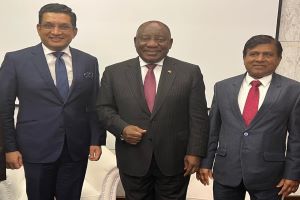
Minister of Foreign Affairs Ali Sabry, accompanied by the Minister of Justice, Prison Affairs and Constitutional Reforms Wijeyadasa Rajapakse, concluded the 3 day working visit to South Africa from 21-25 March 2023.
It is recalled that the Cabinet of Ministers in January this year approved the concept of a Truth and Reconciliation mechanism as proposed by the Cabinet Sub-Committee on Reconciliation, which is chaired by President Wickremesinghe. The proposed concept states that an independent, domestic mechanism of truth seeking is identified as a meaningful way for Sri Lanka to advance and secure peace, after the country’s arduous journey of ending conflict of three decades. The Cabinet also authorized the Minister of Foreign Affairs and the Minister of Justice to operationalize this concept and to initiate discussions and facilitate the drafting of a Truth and Reconciliation law. It is in support of this process, the current visit took place at the invitation of the South African Government.
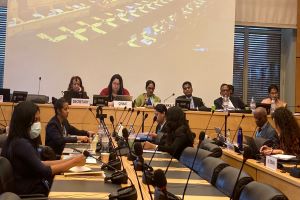
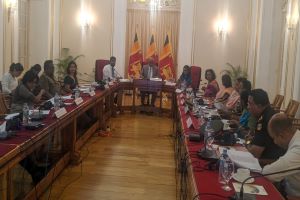
Sri Lanka participated in its 6th Periodic Review under the International Covenant on Civil and Political Rights (ICCPR) on 8 and 9 March 2023in Geneva. The Review was conducted in a hybrid format, during three 2-hour sessions over two days by the Human Rights Committee. The preparations for the Review were led by the Ministry of Foreign Affairs over the past several weeks and included participation by a number of government agencies.
The Human Rights Committee is a body comprised of 18 independent experts that monitor the implementation of the ICCPR. The Reviews of all States Parties to the Covenant are conducted by the Committee. In addition to Sri Lanka the Committee also reviewed Egypt, Turkmenistan, Zambia, Peru, and Panama during its 137th Session from 27 February to 24 March 2023.
In her opening statement, the Head of the Sri Lanka Delegation Permanent Representative of Sri Lanka to the UN in Geneva Ambassador Himalee Arunatilaka, said that since the submission of Sri Lanka’s 6th Periodic Report in 2019, many significant developments in the country have taken place, including the enactment of the 21st Amendment to the Constitution, further strengthening democratic governance through the Constitution, Regulation of Election Expenditure Act, amendments to the Prevention of Terrorism Act and drafting of anti-terrorism legislation, reconciliation through independent domestic mechanisms, convening of an All Party Conference, establishment of a Cabinet Sub-Committee on Reconciliation and release of land held by military for security purposes in the North and the East to the legitimate owners. Ambassador Arunatilaka also pointed out that the period under review posed unprecedented socio-economic challenges for Sri Lanka and the Government’s main objective during the past year was to restore economic and political stability and on delivering urgent socio-economic necessities.
Sri Lanka’s 6th Periodic Review under the International Covenant on Civil and Political Rights (ICCPR) will be held on 8 and 9 March 2023 in Geneva.
It is recalled that Sri Lanka acceded to the ICCPR on 11 June 1980. Currently, 173 countries have ratified the ICCPR. In addition to the implementation of the Covenant, all States Parties to the Covenant have undertaken a voluntary obligation to submit periodic reports to the Committee and participate in periodic reviews.
Accordingly, Sri Lanka has submitted 5 Periodic Reports in 1983, 1990, 1994, 2003 and 2013 and has participated in 5 Reviews in 1983, 1991, 1995, 2003 and 2014.
The 6th Report was submitted on 22 February 2019 to the Human Rights Committee. The Human Rights Committee is a body comprised of 18 independent experts that monitor the implementation of the ICCPR. The Reviews of all countries are conducted by the Committee.
At the request of Sri Lanka, the 6th Review will be conducted in hybrid format and will be led by Sri Lanka’s Permanent Representative to the UN in Geneva Himalee Arunatilaka. The Sri Lanka delegation also comprises senior officials from the Presidential Secretariat, Ministry of Public Security, Attorney-General’s Department, Ministry of Foreign Affairs, and the Permanent Mission of Sri Lanka to the UN in Geneva participating in person. Senior officials from Colombo will join the Review virtually representing the Ministry of Justice, Prison Affairs and Constitutional Reforms, Ministry of Defence, Ministry of Women, Child Affairs and Social Empowerment, Ministry of Health, Department of Prisons, Department of Police, Office on Missing Persons (OMP), Office on Reparations (OR) and Office for National Unity and Reconciliation (ONUR).
In addition to Sri Lanka, the following countries will also be reviewed by the Human Rights Committee during its 137th session to be held from 27 February to 24 March 2023: Egypt, Turkmenistan, Zambia, Peru, and Panama.
Ministry of Foreign Affairs
Colombo
06 March 2023
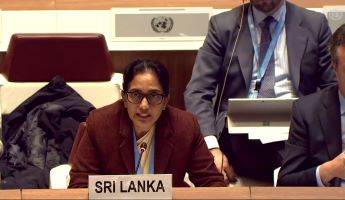
Mr. Chair,
Our delegation commends your leadership in steering our work in the Group of Governmental Experts and assure you of our continued support as we endeavor to advance our work in the GGE.
As a country that has consistently advocated for the importance of centrality of human control in weapons system and the legal, ethical, military as well as security concerns related to autonomous weapon systems we are encouraged by the recent developments and the growing momentum on the call for regulation in autonomous weapon systems. We consider the joint statement delivered at the UNGA last year supported by 70 states on this subject as well as the Communiqué issued at the Latin American and the Caribbean Conference of Social and Humanitarian Impact of Autonomous Weapons more recently calling for “the urgent negotiation of an international legally binding instrument on autonomy in weapons systems” as important steps forward in this regard. We emphasize on the importance of building on these progressive developments to ensure meaningful human control in weapon systems through the development of an international legally binding instrument.
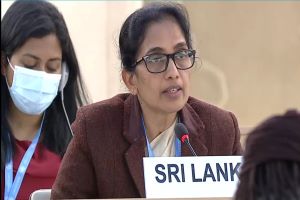
Mr. President,
Distinguished delegates,
I take the floor in keeping with Sri Lanka’s continuing policy of constructive engagement with the UN human rights instruments and mechanisms.
As we mark the 75th anniversary of the UDHR, and the 30th anniversary of the Vienna Declaration and Programme of Action (VDPA), we must resolve to preserve the spirit of multilateralism and the foundation of human rights governance. We must also strive to depoliticize human rights and find solutions to concerns through dialogue and multilateral cooperation rather than through confrontation, selectivity and unilateralism.
Mr. President,
We envisage 2023, the 75th anniversary of our independence, which coincides with the 75th Anniversary of the adoption of the Universal Declaration to be a year of socio-economic stabilization, reconciliation, and recovery.
The domestic institutions for reconciliation and accountability in Sri Lanka continue to carry out their work towards achieving important post-conflict recovery and healing.
A Cabinet Sub-Committee has been established under the Chairmanship of the President, to promote reconciliation among different communities and to address and resolve matters relating to issues encountered by the peoples of the Northern and Eastern Provinces.
